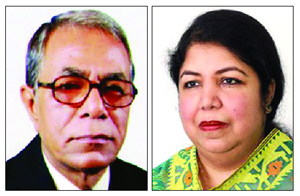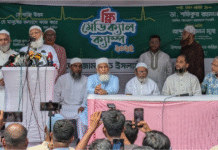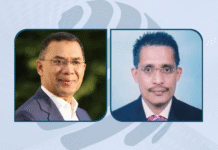Sadeq Khan
The political strategy of the mainstream opposition movement, 18-party alliance turned 19-party grouping under the leadership of BNP chief Begum Khaleda Zia with Kazi Zafar’s Jatiyo Party wing newly enrolled by her side, is in evident jeopardy. Abandoning “hard programmes” of hartal or siege, often violently pursued through the year 2013 to enforce transition of power by fair elections under a neutral caretaker government, Begum Zia in her January 15 press conference implied that the oligarchs in power had failed to obtain contest in more than half of the constituencies and to persuade voters to cast ballots in the remaining constituencies in January 5 polls, and by bending constitutional requirements, hurried to usher in an all-party government commanding an obedient parliament, in line with a one-party system (BAKSHAL) under multiparty guise.
Success in rendering January 5 polls voterless meant a “silent revolution” in the polity. The parliament is unrepresentative and the government is illegitimate, and as such bound to break down soon, rejected by the people (and in due course by the institutions of the state). Later she held a mammoth rally in Dhaka, obeying conditions laid down by relevant institution of the state by limiting overt presence of her Islamist allies in that rally. She had also reportedly issued instructions to consolidate the popular base of her alliance by participation in upozilla polls in a concerted manner.
But her prescribed 19-party black flag demonstrations, to protest the opening session of the impugned 10th parliament, was as usual visibly robust in all the mofussil districts, defying police firing in places, but failed to defy the police ban in the metropolis where activists in only a few wards were spared the rod by the security cordon, others (like the Jamat demonstration in Paltan crossing) succumbing to tear gas shells, rubber bullets, lathi-charge and arrests. One wonders whether the combined opposition may fall back on late Nelson Mandela’s edict, under similar constraints that when the state machinery-uses violence in intolerance, protest cannot remain innocuous.
Propaganda strategy falters
Meanwhile Sheikh Hasina Wajed’s bandwagon has been feverishly active, supported by overt and covert diplomatic orchestration from lone backers in Delhi, to repair the chasm of disapproval over the January 5 polls between the third Hasina government and the international community. But its propaganda strategy, too economic with truth and often devious, is also in evident disarray. The supportive role of the Indian media has also been faltering. Immediately after the polls, the Indian Express on Jan 6 posted the following comments:
“Bangladesh’s violence-marred general election, 42 years after the country won independence, was a throw-back to the unfinished business of 1971. These polls cannot be isolated from the bigger battle that has raged in the streets ever since the Sheikh Hasina government initiated the war crimes trial process. This process has pronounced several leaders the collaborating Razakars of the Jamaat-e-Islami guilty.
“The Jamaat, one of the pillars of the Bangladesh Nationalist Party (BNP)-led opposition alliance, has unleashed bombings, arson, murders of civilians and policemen as well as attacks on minorities in retaliation. While Hasina’s government has been trying to preserve Bangladesh’s identity as a secular and liberal state, for the Jamaat this is a fight for survival and ultimately an attempt to impose an Islamist identity on the country. In other words, this is a war for Bangladesh’s soul.
“Undeniably, the way the election played out has raised serious questions of procedure and legitimacy. In the run-up, the Awami League-led (AL) government refused to make way for a caretaker government and defer polls as the opposition had demanded, which then announced a poll boycott. However, Western states, particularly the US and EU and Commonwealth members that have refused to send observers and which could withhold recognition to a re-elected Hasina government, may well be quizzed about their selective indignation.
‘Delhi failed Hasina’
“New Delhi has failed the besieged Hasina on several fronts. It now appears to have woken up to the diplomatic task of securing international support for her in this difficult moment. India must affirm its own support for her in the larger battle against extremist forces, but Delhi must also use its goodwill to urge her to reach out to the opposition and begin a dialogue process so that a new political compact can be forged. Meanwhile, Zia needs to rethink her alliance with the Jamaat, the continuance of which can only further damage Bangladesh.”
The Telegraph of Calcutta, India published a dispatch sent on the same day under the title: For Hasina, India swims against tide – Delhi stands by ally despite ‘sham’ polls. The dispatch read:
“The developments in Bangladesh are compounding the challenges before India’s foreign policy establishment which today decided to recognise Sheikh Hasina’s ‘victory’ in the general election.
“Unlike the sceptical West, India indicated that it would support Hasina’s claim to form the next government in Dhaka. The decision is significant, given an assessment that Hasina may have to face another election. The US tonight said it was ‘disappointed’ by the election and called on the Bangladesh government as well as the Opposition to engage in immediate dialogue to find a way to hold ‘free, fair, peaceful, and credible’ elections as soon as possible, Reuters reported. ‘The results… do not appear to credibly express the will of the Bangladeshi people,’ the state department said. Estimates of voter turnout yesterday ranged from 5 per cent to 35 per cent, although the Bangladesh election commission announced 39 per cent which is still far lower than the 83 per cent five years ago.
“(Sheikh Hasina) dropped hints of another election if Khaleda agreed to her conditions: ‘I call upon all again, including the honourable leader of the Opposition (Khaleda), for peaceful talks discarding the path of terrorism and violence and severing ties with war criminals and the militant Jamaat.’
India stands by Hasina
“The US, EU and the Commonwealth had principally blamed Hasina for the failure in conducting a participatory election. They had also refused to send observers to monitor Sunday’s election which is being seen as an indication that they do not intend to recognise the legitimacy of the poll verdict. India, however, stood by the Hasina government ahead of the polls, which many believe gave her the courage to hold the election. India has maintained this stand even after the polls, though the BNP called the election a ‘farce’ and the new government ‘illegitimate’.
“(The spokes person of Indian ministry of external affairs said:) ‘Elections in Bangladesh on 5th January were a constitutional requirement. They are a part of the internal and constitutional process of Bangladesh.’ The democratic processes must be allowed to take their own course in Bangladesh.’
“Although Hasina said today that maintaining law and order would be the priority of the new government and issued instructions to police and the army to quell disruptive protests, the phase of uncertainty is far from over.”
But misreading routine messages of congratulations from foreign governments for the newly installed de-facto government succeeding the one that completed its tenure, Sheikh Hasina changed her tune and her bandwagon started beating drums that she is set to complete a third five year term. The new mood of the power elite around Sheikh Hasina Wajed was endorsed and analysed by commentator Subir Bhaumik, in The Telegraph of Calcutta dated January 26, as follows: “(By dint of impugned January 5 polls, Sheikh Hasina) Wajed was aware of the limitation in which she was taking over as prime minister for a third time as she promised a dialogue with the opposition and fresh polls as soon as a consensus was reached. The United States of America rubbished the elections as less than credible and its envoy in Dhaka, Dan Mozena, called for fresh dialogue and mid-term polls to let the Bangladesh people express their will freely. The European Union and the Commonwealth also dubbed the polls one-sided and called for fresh elections. Only India expectedly backed Wajed, saying that the polls were a constitutional necessity.
But within a week, the situation has changed for her. Russia has come out in support of Wajed’s government, saying it looked forward to a constructive partnership and cooperation with the new government.”
Russian support not unqualified
In fact, Russia’s “support of Wajed’s government” was far from unqualified. In its official site, the actual comment posted on January 9 of the Russian Ministry of Foreign Affairs regarding the parliamentary elections in Bangladesh read as follows:
“On the 5 January, parliamentary elections were held in Bangladesh. The National League won. It is regrettable that the voting was put under boycott by main opposition forces of the country. Russia confirms its readiness to continue constructive partner cooperation with the government which will be formed on the basis of the will of the Bangladeshi voters.”
Subir Bhaumik’s main presumption was that China may now be inclined to support Hasina to “please India” and make a common cause of denying US naval foothold in the Bay of Bengal. He suggested that “in private, Chinese diplomats have wondered why the US, especially its envoy, Mozena, had so strongly backed the BNP in the run-up to the elections and appeared to be doing that now. They suspect Washington is cultivating Khaleda Zia to secure a base in the Bay of Bengal after India rejected US efforts to seek a base in southern India.” His conclusion: “Before the January 5 polls, the usually quiet Chinese envoy in Dhaka, Li Jun, had called for a dialogue between the Awami League and the BNP, so that wisdom prevailed over violence. But as Wajed assumed office and formed her cabinet, she received a message from the Chinese prime minister, Li Keqiang, saying that China was keen to ‘join hands’ with her government to advance the Sino-Bangla ‘comprehensive and cooperative partnership to a new height.’
“Li’s letter had no mention of the elections, let alone referring to its credibility or one-sided nature. The Chinese premier was clearly sending a message to the West, specially the US, that the business of democracy and governance be better left to the government in Dhaka. In December, the Chinese had told Indian and Bangladesh officials at a BCIM meeting in Kunming that Beijing was keen to work with both Delhi and Dhaka to develop an economic corridor connecting Calcutta and Kunming that would ‘open a new chapter in our relationship and economic development’. Now by breaking away from its strict equidistance policy and supporting the Hasina Wajed government, China is seeking to warm up to India as well and drive home the message that it would be only too happy to work with India in the region.
Strategic undercurrents
That this comes at a time when India-US relations are at a low following l’affaire Devyani is significant. Chinese officials have previously dropped broad hints to Indian diplomats that the deep sea port they plan to build at Sonadia off the Cox’s Bazar coast would be useful to India in accessing its Northeast. Beijing is keen to draw India out of the US ambit and what better time than now? The expression of support for Wajed, who is seen as close to India is, for China, (is) like killing two birds with an arrow.”
That line of argument was termed by knowledgeable quarters in Dhaka as wishfully convoluted: Indeed, the US embassy in Dhaka and visiting naval commanders had repeatedly and unambiguously asserted that US navy sought no base at all crossing the shallow sea-lanes leading to Bangladesh ports. Both USA and China were helping the capacity build-up of Bangladesh navy and coast guards for defence as well as antipiracy and anti-terrorist operations. The BCIM agenda is also supported by Khaleda Zia. Specifically after the January 5 polls, the Chinese ambassador on January 11 called on Khaleda Zia, the leader of the opposition alliance, and in almost an hour-long meeting explained the official Chinese position as follows: “China wants to see a fruitful dialogue between the major political parties in Bangladesh for holding free, fair and inclusive polls to resolve the political stalemate.
“Instability might hit Bangladesh if democracy is hindered. And in that case, the country might be into an economic and social crisis.
“We want to see a sovereign and independent Bangladesh. We want betterment of Bangladesh in terms of political, social and economic progress.”
Wrong interpretations
Subir Bhaumik also wrongly inferred: A day after the statement of Chinese support for Wajed’s government, the US state department appeared mellowed. ‘We are prepared to work with the Hasina government,’ said its deputy spokesperson, Marie Harf, in a statement, though she was quick to add that the US considered the January 5 polls as not credible and reflective of the popular will. But Harf did not insist, as Mozena had done last week, on ‘immediate elections’.
That inference was given the lie, as was a similar report in Dhaka quoting the Bangladesh ambassador to the United States, by Emily Horn, spokesperson of the South and Central Asia bureau of the US State Department in writing. She said that the USA has been consistently calling for political dialogue to be started immediately towards holding a free, fair, inclusive and credible election acceptable in the eyes of the people in Bangladesh. She further asserted that Ambassador Dan Mozena has not been following any personal agenda but simply pursuing the policies of US President Obama.
Reportedly under pressure from the US State Department, the Bangladesh embassy in Washington itself had to come out with a rejoinder to the report suggesting US change of stance over the post-polls administration in Bangladesh. The rejoinder referred to “report carried by a section of media on a meeting held between Bangladesh Ambassador to US Mr. Akramul Qader and US Assistant Secretary of State Ms. Nisha Desai Biswal on 24 January 2014” and regretted that “while putting forward the United States position with regard to the newly elected government in Dhaka, the report misquoted Ambassador Qader and misrepresented the contents of the discussion held with Ms. Biswal.” The rejoinder clarified: “It was Ambassador Qader who referred to State Department spokesperson’s remarks at a press briefing on 13 January 2014 where US’s intention to continue to work with the government of Sheikh Hasina was expressed. Assistant Secretary Biswal did not add anything to it but the report in question resorted to present it as legitimacy accorded by the US for the newly elected government in Bangladesh. The issue of legitimacy was never discussed during the meeting.”
Source: Weekly Holiday











Haha…lol,the composer of this article thinks that AL government is working hard for the survival of our nation. I think you have been watching too many Bollywood films and eating out of control. You could have at least come clean about the government short fall & that would have restored your honour as a true democratic activist instead of AL bias activist. Power & money can only stretch so far so can the AL government. They are acting like rabbits on headlights at the moment & busy planning their exit strategy. I wish them a quick getaway as we don’t want to get tied down with their long never ending judiciary campaign. They have done enough killing & hanging & we can do with a little stability now. This country is nobody’s personal possession & naming her father as Best Bangali ever is not going to bring food to poor people or increase our exports.